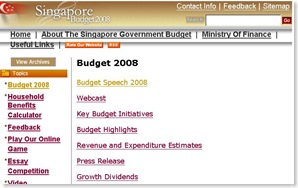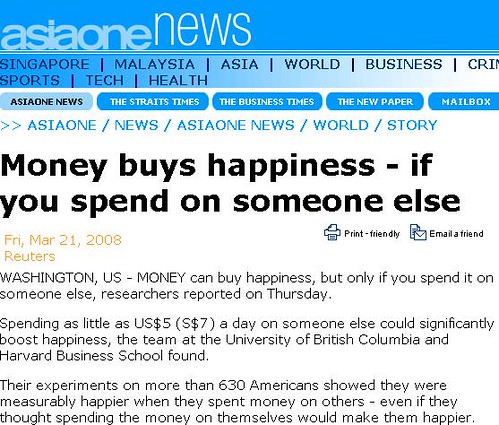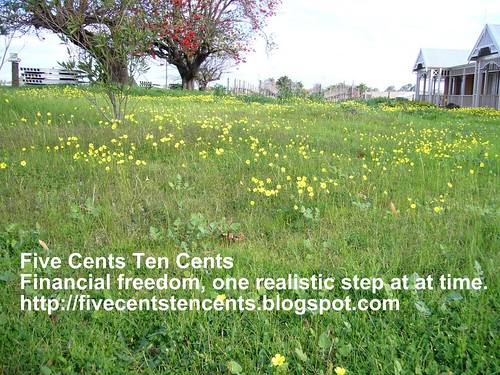 Finance Minister has announced the slew of "goodies" that the Government will be giving to citizens back much of the taxes it has taken for us for FY 2007. Instead of the deficit of $0.7 billion, the excellent economic growth coupled with the Singapore property boom resulted in a SGD 6.4 billion surplus. The Government definitely "huat" for 2007. So why quibble about SGD 2-3 million for each minister? The dream team managed to conjure up SGD 6.4 billion surplus.
Finance Minister has announced the slew of "goodies" that the Government will be giving to citizens back much of the taxes it has taken for us for FY 2007. Instead of the deficit of $0.7 billion, the excellent economic growth coupled with the Singapore property boom resulted in a SGD 6.4 billion surplus. The Government definitely "huat" for 2007. So why quibble about SGD 2-3 million for each minister? The dream team managed to conjure up SGD 6.4 billion surplus.
Of course, in good times, the Government should spend on its citizens. Some netizens commented that GIC and Temasek can pour easily SGD 10 billion into US and European financial institutions hit by sub-prime but only gives its own citizens a miserly SGD 1.8 in sharing of the surplus.
How does the 2008 budget benefit you PERSONALLY?

The discussion below is not meant to be comprehensive but to give you a "feel" of how the budget impacts you.
1) Growth dividends
All citizens aged 21 and above who have signed up for the GST credits will automatically receive this. It ranges from $100 for higher income earners and higher property type owners to maximum of $600. NSmen, ex-NSmen and NSFs get $100 more but I don't think many qualify to get $600+$100=$700 because you would have to have a home with annual value < $5,000, annual assessable income of <$24,000 and be aged 60 and older. So perhaps ex-NS regulars who have retired?
2) Medisave top-ups
Mainly for those aged 51 and older. Sorry, if you're younger you're on your own.
3) LIFE Bonus
Again, this applies more to those aged 46 and above.
4) Tax Reliefs for CPF Top-ups and Tax Rebate of 20% (subject to cap of $2,000)
The tax reliefs for top-ups are nice but the tax rebate of 20% means you final tax payable is reduced by the lower of 20% of $2,000. This is quite a big saving for those who pay income tax. The difference between a tax relief and a tax rebate is that tax reliefs reduce your chargeable income i.e. income subject to tax BUT tax rebates are a direct discount off your tax bill.
5) Tertiary Education
More bursaries if you qualify under the lower income categories. But if you don't qualify it doesn't affect you so much.
6) Post-Secondary Education Accounts (PSEAs)
$150 to $600 per child that varies with age (older 13 to 20 get double that of 7 to 12) and those who stay in homes with annual value >11,000 get less.
7) Estate Duty Abolished
This means that if you have investible savings that exceed the previous cap of $600,000, you no longer need to consider parking your funds in a residential dwelling (whether owner-occupied or not) as previously you would get hit with 5% estate duty for value of movable property in excess of $600,000. The cap for residential dwellings is $9 million. So do continue to live within your means, save and invest because you can bequeath ALL of it to your children WITHOUT estate duty. Unfortunately, this benefits the rich more than the rest but hey, Singapore is a CAPITALISTIC society and it is every man, woman and child for himself or herself.
Panzer's Wrap-Up
Considering the huge surpluses chalked up by the Government from the resurgent property market as well as GST increase coupled with economic growth, the Government has to give something back to the people to assuage their anger, dissatisfaction and dismay at how inflation has reared its ugly head on our fair shores with price increases for virtually EVERY household expenditure. You name it, its price has gone up.
Even my neighbourhood economical rice stall has raised its price from $2.50 to $2.70 (8% increase). Of course, the Minister for Finance will quote you statistics to tell you that on average, real wages have gone up but *ahem* guess WHOSE wage has gone up much more than inflation. As Michael Jackson sang in the song, "Man in the Mirror", he goes, "Take a look at yourself and make a change....ange...ange....ow...."
Oh, side note. The addtional top-up for NSmen of $100 is pathetic. It is quite a big insult because what the Government is saying is that for the 2.5 years (now 2 years) of full-time National Slavery coupled with 10 years of annual In-Camp Training is only worth a miserly $100 extra. I think I have bought more than $100 worth of army related gear from beach road during my 2.5 years + 10 years of reservist. But hey, why complain when the Government is giving SO MUCH back to citizens after taxing us left, right up and down with income, property, goods and services, ERP and other fees and charges levied at us?
Enjoy your Growth Dividends and Majullah Singapura.





 My good friend once remarked that once he had achieved financial freedom, he would want to spend his time drinking a leisurely cup of coffee on weekday mornings and watch the morning crowd pass him by as they go about working for a living.
My good friend once remarked that once he had achieved financial freedom, he would want to spend his time drinking a leisurely cup of coffee on weekday mornings and watch the morning crowd pass him by as they go about working for a living.

















